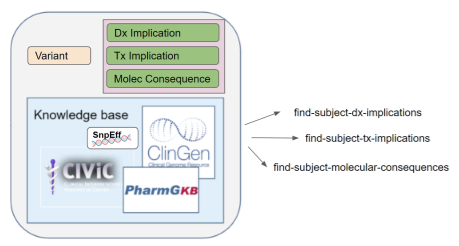This page is part of the Genetic Reporting Implementation Guide (v3.0.0-ballot: STU 3 Ballot 1) based on FHIR (HL7® FHIR® Standard) R4. The current version which supersedes this version is 3.0.0. For a full list of available versions, see the Directory of published versions
| Official URL: http://hl7.org/fhir/uv/genomics-reporting/OperationDefinition/find-subject-dx-implications | Version: 3.0.0-ballot | |||
| Active as of 2023-12-18 | Computable Name: FindSubjectDxImplications | |||
Retrieves genetic diagnostic implications for variants.
Retrieves genetic diagnostic implications for variants.
Generally, the operation will be called with 'subject' and 'ranges' parameters, which will return diagnostic implications for patient variants in supplied ranges. Another common pattern is to call the operation with just 'subject' and 'conditions' to do a broad sweep of the patient's variants for any associated with the supplied conditions; or with 'subject', 'ranges', and 'conditions' parameters, which will limit the return to diagnostic implications for the supplied conditions in supplied ranges - this is useful, for instance, to see if a patient has any variants in a given gene that are associated with a given disease. For other combinations of input parameters, the operation returns diagnostic implications satisfying all parameters.
Where no variants, ranges, or conditions are provided, the operation returns no implications.
As shown in the following picture, this operation can return previously instantiated implications and/or dynamically computed implications. Specific implementations can indicate their capabilities using a FHIR Capability Statement. Rules around the retention of dynamically computed implications are outside the scope of this operation, but a server could potentially instantiate those results based on the Therapeutic Implication, Diagnostic Implication, or Molecular Consequence FHIR profiles.

The committee is actively seeking feedback on the feasibility of using this operation to return dynamically computed implications of structural variants.
Parameters
| Use | Name | Scope | Cardinality | Type | Binding | Documentation |
| IN | subject | 1..1 | string (reference) | The subject of interest. | ||
| IN | variants | 0..* | string (string) | List of variants from which implications are derived. Must be in HGVS or SPDI format. | ||
| IN | ranges | 0..* | string (special) | List of regions to be searched for variants. Must be in zero-based RefSeq:Integer-range format (e.g. 'NC_000007.14:55174721-55174820'). | ||
| IN | conditions | 0..* | string (token) | List of conditions for which implications are sought. Must be in token or codesystem|code format. | ||
| IN | testIdentifiers | 0..* | string (token) | Supply a list of test identifiers. Only results originating from one of these tests will be returned. | ||
| IN | testDateRange | 0..1 | Period | Supply a date range. Only results generated during this range will be returned. | ||
| IN | specimenIdentifiers | 0..* | string (token) | Supply a list of specimen identifiers. Only results derived from one of these specimens will be returned. | ||
| IN | genomicSourceClass | 0..1 | string (token) | Enables an App to limit results to those that are 'germline' or 'somatic'. Default is to include variants irrespective of genomic source class. | ||
| OUT | implication | 0..* | Observation | Implications must conform to [Profile: http://hl7.org/fhir/uv/genomics-reporting/StructureDefinition/diagnostic-implication]. The target(s) of the implication's derivedFrom shall also be included in the response. | ||
| OUT | variant | 0..* | Observation | Variants must conform to [Profile: http://hl7.org/fhir/uv/genomics-reporting/StructureDefinition/variant]. |
Contents:
Valid response codes are shown in the following table. Additional response codes (e.g. 5xx server error) may also be encountered.
| Response Code | Description |
|---|---|
| 200 | Successfully executed request |
| 400 | ERROR: Invalid query parameters |
| 404 | ERROR: Patient not found |
| 422 | ERROR: Failed LiftOver |
Clinician seeks to determine if their patient has any diagnostic implications for familial hypercholesterolemia.
$find-subject-dx-implications?subject=HG00403&conditions=http://snomed.info/sct|398036000
Clinician now wants to further constrain results from the preceeding example, to only return variants in the LDLR gene (NC_000019.10:11089431-11133820) that are associated with familial hypercholesterolemia.
$find-subject-dx-implications?subject=HG00403&conditions=http://snomed.info/sct|398036000&ranges=NC_000019.10:11089431-11133820
Patient HG00403 has a germline variant in the RYR1 gene (NC_000019.10:38499669:C:T). What are the diagnostic implications of this variant? (Results indicate that the variant is pathogenic for Malignant Hyperthermia).